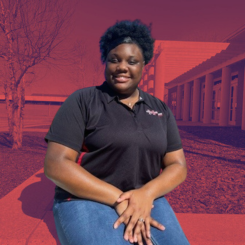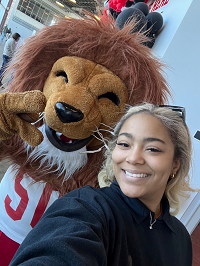Admission to the Funeral Service Technology Program at East Mississippi Community
College requires all applicants to have acquired either a GED or high school diploma.
The program requires all applicants to achieve either a score of 17 or higher on the
ACT or a combined score of 502 on the reading and writing sections of the ACCUPLACER
test, along with a minimum score of 242 on the math section of the ACCUPLACER test.
For additional information regarding testing times and locations, please contact the
program advisor or a counselor.
To complete the program, students must complete all Funeral Service Technology courses
with a minimum grade of “C.” Students must have active, hands-on participation in
a minimum of ten (10) clinical embalming cases and may be required to perform such
clinical exercises during the weekend at an off-campus clinical site.
A student who has taken one or more Funeral Service Technology courses, but who withdraws
from the program and does not return for a three (3) years or six (6) semesters excluding
summer semesters, must re-enroll under the current Funeral Service Technology curriculum
at the time of re-enrollment and must re-take all required Funeral Service Technology
courses.
Coursework taken at any funeral service program, which is transferred for credit to
EMCC, will be evaluated and considered for acceptance in meeting the curriculum of
the Funeral Service Technology program. However, no course in Comprehensive Review
or a similar course designed for preparation for the National Board Examination as
administered by the International Conference of Funeral Service Examining Boards,
will be accepted for transfer credit.
Freshman | First Semester | 18 Semester Hours
ENG 1113 English Composition I – 3 Semester Hours
FST 1113 Mortuary Anatomy I – 3 Semester Hours
FST 1313 Funeral Directing – 3 Semester Hours
FST 1513 Restorative Art I – 3 Semester Hours
FST 2423 Business Law – 3 Semester Hours
Social/Behavioral Science – 3 Semester Hours
Freshman | Second Semester | 17-19 Hours
MAT 1313 College Algebra or higher or Natural Science Elective – 3-4 Semester Hours
FST 1123 Mortuary Anatomy II – 3 Semester Hours
FST 1413 Funeral Service Ethics & Law – 3 Semester Hours
FST 1533 Restorative Art II – 3 Semester Hours
FST 2323 Funeral Merchandising and Management – 3 Semester Hours
Academic Elective – 2-3 Semester Hours
Sophomore | First Semester | 17 Hours
ACC 2213 Accounting I – 3 Semester Hours
FST 1214 Embalming I – 4 Semester Hours
FST 2713 Psychosocial Aspects of Grief & Death – 3 Semester Hours
FST 2613 Microbiology/Pathology – 3 Semester Hours
FST 2821 Current Issues in Funeral Service Technology – 1 Semester Hours
Social/Behavioral Science – 3 Semester Hours
Sophomore | Second Semester | 16 Hours
FST 1224 Embalming II – 4 Semester Hours
FST 2273 Thanatochemistry – 3 Semester Hours
FST 2813 Comprehensive Review – 3 Semester Hours
SPT 1113 Public Speaking I – 3 Semester Hours
Humanities/Fine Arts – 3 Semester Hours
Work-based Learning is available as an additional elective based on opportunity and
requirements.
National Board Examination pass rates, graduation rates, and employment rates for
this and other ABFSE-accredited programs are available at www.abfse.org in the Directory of Accredited Programs. To request a printed copy of this program’s
rates, go to Funeral Service Technology Office, Room 27, Hawkins Building, Scooba
Campus or by email at khurt@eastms.edu or by telephone (662) 476-5100.
PROGRAM INFORMATION
2024
- Total Enrolled: 20
- # of New Students: 22
- # of Grads: 17
- Timely graduation: 17
- Graduation rate: 100%
- Did not Finish: 0
- Overall employed: 100%
- Employed in funeral service: 76%
2023
- Total Enrolled: 38
- # of New Students: 20
- # of Grads: 13
- Timely graduation: 13
- Graduation rate: 87%
- Did not Finish: 10
- Overall employed: 92%
- Employed in funeral service: 85%
2022
- Total Enrolled: 45
- # of New Students: 26
- # of Grads: 10
- Timely graduation: 10/10
- Graduation rate: 91%
- Did not Finish: 8
- Overall employed: 100%
- Employed in funeral service: 80%
*Timely graduation = complete program in 1 1/2 times designated program length.
**Graduation rate reflects cohort graduation rate (% of students from original chort
completeing in the designated year)
***Left before complete the program; did not finish.
NATIONAL BOARD STATISTICS
| Single Year |
Takers |
School Pass Rate |
National Pass Rate |
| 2024 Arts |
13 |
77% |
78% |
| 2023 Arts |
10 |
70% |
78% |
| 2022 Arts |
10 |
50% |
69% |
| Single Year |
Takers |
School Pass Rate |
National Pass Rate |
| 2024 Sciences |
16 |
69% |
73% |
| 2023 Sciences |
7 |
78% |
69% |
| 2022 Sciences |
7 |
71% |
64% |
Accreditation Program Accredited by ABFSE: Associate in Applied Science - Funeral
Service Technology
Initial Accreditation 1975/Last comprehensive review 2023/Next comprehensive review
2030
Re-accreditation: October 2023 for period of 7 years with progress report due February
15, 2024 (see below) Most recent Accreditation decisions:
- April 2013 accreditation extended to October 2020. Probation continued to April 2021.
Final decision delayed due to COVID-19 pandemic.
- May 2020 - program placed on Probation following comprehensive review subject to evaluation
of a compliance report (due September 1, 2020) to demonstrate implementation of an
effective assessment plan.
- October 2020 -additional assessment data required by February 2021.
- April 2021 - Program returned to good standing (Probation concerns satisfied). Program
will submit an updated assessment plan.
- April 2022 - COA reviewed an updated assessment plan submitted February 2022. The
plan appears to be lacking attention to Standard 10.1.1a. An updated plan is due for
COA review by September 1, 2022.
- October 2022 - Updated assessment plan accepted by COA. Administrative Probationary
Accreditation for failure to pay accreditation renewal fees.
- February 2023 - Administrative Probation resolved. Program in 'Good Standing.'
- October 2023 - Reaccreditation for seven (7) years with a progress report to verify
that course descriptions for all courses are uniform across all sources of information;
provide an updated document retention policy for Funeral Service Technology; verify
that the new curriculum has been implemented.
- April 2024 - Submit revised follow-up report by September 1, 2024 to address stipulations.
- October 2024 - Stipulations satisfied.




 Request Information
Request Information






